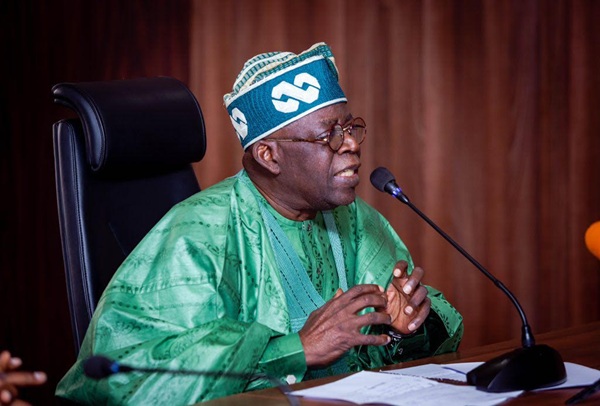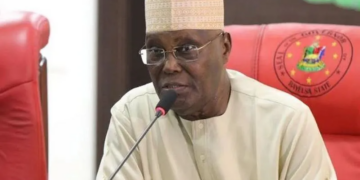President Bola Tinubu has granted clemency to 175 convicts and former convicts, with the Presidency explaining that the decision was based on several factors including remorse, good conduct, old age, acquisition of vocational skills, and enrolment in educational programmes.
According to a statement released by the Special Adviser to the President on Information and Strategy, Bayo Onanuga, on Saturday, the Presidential Advisory Committee on the Prerogative of Mercy, chaired by Attorney-General and Justice Minister, Prince Lateef Olasunkanmi Fagbemi, recommended the pardons after careful consideration.
The Presidency disclosed that President Tinubu granted clemency to most beneficiaries based on reports showing that they had demonstrated remorse and good conduct during their incarceration.
Other factors considered included old age and health conditions, acquisition of new vocational skills while in prison, enrolment in the National Open University of Nigeria (NOUN), time already served, and family circumstances, particularly involving dependent children.
The comprehensive list of beneficiaries include two inmates granted full pardon, 15 former convicts pardoned (11 of whom have died, receiving posthumous pardons), 82 inmates granted clemency, 65 inmates whose sentences were commuted, and seven inmates on death row whose sentences were commuted to life imprisonment.
Among those pardoned were notable individuals, including Nweke Francis Chibueze, 44, who was serving a life sentence for cocaine, and Dr. Nwogu Peters, 67, who was serving a 17-year jail term for fraud since being sentenced in 2013.
Also pardoned was Hon. Farouk M. Lawan, 62, who had served a five-year sentence for corrupt practices imposed in 2021.
Other beneficiaries of full pardon include Mrs Anastasia Daniel Nwaoba, 63, who had already served a sentence for fraud, Barr. Hussaini Alhaji Umar, 58, who was sentenced in 2023 to pay a fine of N150 million in an ICPC case, and Ayinla Saadu Alanamu, 63, who was sentenced to seven years for bribery in 2019 and had served the sentence.
President Tinubu also addressed historical wrongs by granting posthumous pardons to Sir Herbert Macaulay, one of Nigeria’s foremost nationalists who was banned from public office and sentenced in 1913 by British colonialists for alleged misappropriation of funds. Major-General Mamman Jiya Vatsa, who was 46 when he was sentenced in 1986 for treason related to an alleged coup plot, also received a posthumous pardon.
The Ogoni Nine, including Ken Saro-Wiwa, Saturday Dobee, Nordu Eawa, Daniel Gbooko, Paul Levera, Felix Nuate, Baribor Bera, Barinem Kiobel, and John Kpuine, all of whom were sentenced for murder, received posthumous pardons.
The Presidency also honoured the victims of the Ogoni Nine case: Chief Albert Badey, Chief Edward Kobaru, Chief Samuel Orage, and Chief Theophilus Orage.
A significant portion of those granted clemency were illegal miners, with 40 individuals sentenced in 2024 to three years for unlawful mining benefiting from the presidential mercy.
The beneficiaries include Babangida Saliu, 35, Adamu Sanni, 39, Abdulkarem Salisu, 30, and Abdulaziz Lawal, 18, among others. Senator Ikra Aliyu Bilbis signed an undertaking to be responsible for the rehabilitation and empowerment of all convicted illegal miners granted clemency.
The list also included numerous drug offenders who showed remorse and learned vocational skills while incarcerated. Among them are Aluagwu Lawrence, 47, sentenced for Indian hemp in 2015, Ben Friday, 60, who was sentenced to three years or a N1.3 million fine for marijuana in 2023, and Oroke Micheal Chibueze, 21, sentenced to five years for cannabis sativa in 2023.
Other drug offenders granted clemency include Kelvin Christopher Smith, 42, who was sentenced to four years for importing cocaine in 2023, Azubuike Jeremiah Emeka, 31, sentenced in 2021 to five years or a N3 million fine for importing cocaine, and Akinrinnade Akinwande Adebiyi, 47, sentenced in 2023 to three years for dealing in Tramadol.
The Presidency noted that Ahmed Adeyemo, 38, sentenced to 15 years for cannabis and who had already served nine years and five months at Kirikiri, received clemency, as did Adeniyi Jimoh, 31, and Seun Omirinde, 39, both sentenced to 15 years for drugs in 2015 and who had served nine years at Kirikiri.
White-collar criminals also benefited from the presidential mercy. These include Daniel Bodunwa, 43, who was sentenced in 2018 to 10 years for fraudulent intent to forge a land receipt and had served six years in jail, and Rabiu Alhassan Dawaki, 52, sentenced in 2020 to seven years for criminal breach of trust.
One particularly notable case was that of Maryam Sanda, 37, who was sentenced to death in 2020 for culpable homicide and had spent six years and eight months at Suleja Medium Security Custodial Centre.
The Presidency explained that her family pleaded for her release, arguing that it was in the best interest of her two children. The plea was also anchored on her good conduct in jail, her remorse, and her embracement of a new lifestyle, demonstrating her commitment to being a model prisoner.
Human trafficking offenders also received clemency. Ife Yusuf, 37, who was sentenced for human trafficking in 2019 and had served six years at Kirikiri, was granted clemency, as was Patricia Echoe Igninovia, 61, sentenced in 2023 to seven years for trafficking in persons, whose sentence was reduced to five years.
For the 65 inmates whose sentences were commuted, the Presidency cited various reasons including demonstration of remorse, acquisition of vocational skills, good conduct in prison, advanced age, ill-health, and educational pursuits, particularly enrolment at the National Open University.
Yusuf Owolabi, 36, who was sentenced to life in 2015 for manslaughter and had spent 10 years at Kirikiri, had his prison term reduced to 12 years for showing remorse and learning vocational skills.
Similarly, Ifeanyi Eze, 33, sentenced to life in 2021 for manslaughter and who had spent four years at Kirikiri, had his prison term reduced to 12 years for showing remorse and learning vocational skills.
Professor Magaji Garba, 67, who was sentenced in 2021 to seven years for obtaining money by false pretence and had spent three years at Kuje Custodial Centre, had his prison term reduced to four years due to good conduct and advanced age.
Major S.A. Akubo, 62, who was sentenced in 2009 to life at Katsina Custodial Centre for illegally removing 7,000 assorted weapons, had his sentence commuted to 20 years following good conduct and remorsefulness.
Several inmates convicted of conspiracy to hijack a fishing vessel in 2020 and sentenced to 12 years and a N1 million fine at Ikoyi Custodial Centre had their sentences reduced to six years and the fines waived. These include Jude Saka Ebaragha, 44, Frank Insort Abaka, 46, Shina Alolo, 42, Joshua Iwiki, 50, David Akinseye, 44, Ahmed Toyin, 46, Shobajo Saheed, 57, Adamole Philip, 52, Mathew Masi, 39, and Bright Agbedeyi, 46.
Kelvin Oniarah Ezigbe, 44, who was sentenced in October 2023 to 20 years for kidnapping with the sentence taking effect from 2013, had his term reduced to 13 years for showing remorsefulness and attending the National Open University. Frank Azuekor, 42, also sentenced in 2023 for kidnapping and jailed in Kuje Custodial Centre for 20 years, having spent 12 years behind bars from 2013, had his sentence reduced to 13 years based on good conduct and attendance at the National Open University.
Seven inmates on death row had their sentences commuted to life imprisonment.
The Presidency explained these decisions were based on good conduct, remorsefulness, and the length of time spent on death row, with some having been there for over a decade.
Emmanuel Baba, 38, sentenced to death in 2017 for culpable homicide and who had been on death row in Kuje Custodial Centre for the past eight years, had his sentence commuted to life imprisonment based on good conduct and remorsefulness. Emmanuel Gladstone, 45, sentenced in 2020 to death for murder and who had spent five years at Katsina Custodial Centre, had his death sentence commuted to life imprisonment due to good conduct and remorse.
Moses Ayodele Olurunfemi, 51, sentenced to death in 2012 for culpable homicide and who had spent 13 years on death row in Katsina, had his death sentence commuted to life imprisonment, with the Presidency citing his good conduct and remorse. Abubakar Usman, 59, sentenced to death in 2014 and who had spent 14 years on death row in Katsina, had his sentence commuted to life because of his remorse and good conduct.
Other death row inmates whose sentences were commuted include Khalifa Umar, 37, sentenced to death in 2014 and who had spent 11 years on death row in Kano Custodial Centre, Benjamin Ekeze, 40, sentenced to death in 2017 for armed robbery and conspiracy and who had spent 12 years on death row at Kirikiri, Lagos, and Mohammed Umar, 43, sentenced to death in 2018 for culpable homicide and who had spent seven years on death row in Onitsha Custodial Centre.
Prince Fagbemi presented the committee’s comprehensive report at the Council of State meeting chaired by President Tinubu on Thursday.
The presidential pardon and clemency exercise represents one of the most extensive uses of executive mercy in recent Nigerian history, touching on cases spanning drug offenses, white-collar crimes, violent crimes, and historical injustices dating back to colonial times.





